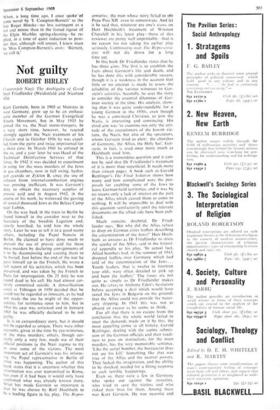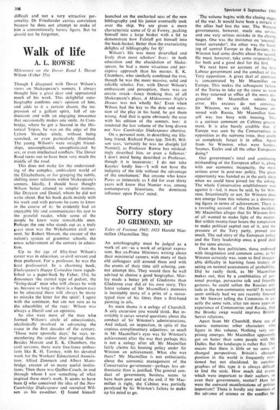Not guilty
ROBERT BIRLEY
Counterfeit Nazi: The Ambiguity of Good Saul Friedlander (Weidenfeld and Nicolson 42s) Kurt Gerstein, born in 1905 at Munster in west Germany, grew up to be an enthusi- astic member of the German Evangelical Youth Movement, but in May 1933 he joined the SA, the Nazi storm-troopers. In a very short time, however, he reacted strongly against the Nazi treatment of his Church and in October 1936 he was expel- led from the party and twice imprisoned for a short time. In March 1941 he enlisted in the ss, and a year later he was Head of the Technical Disinfection Services of that force. In 1942 it was decided to experiment in using for the mass murders of the Jews in gas chambers, now in full swing, hydro- gen cyanide or Zyklon B, since the use of exhaust from internal-combustion engines was proving inefficient. It was Gerstein's duty to obtain the necessary supplies of prussic acid and in August 1942, in the course of his work, he witnessed the gassing of several thousand Jews at the Belzec Camp near Lublin.
On the way back in the train to Berlin he found himself in the corridor next to the Secretary of the Swedish Legation and, utterly horrified, he told him the whole story. Later he was to tell it to a good many others, including the Papal Nuncio in Berlin. He claimed to have done much to prevent the use of prussic acid for these mass murders by declaring consignments of it to be decomposing and causing them to he buried. Just before the end of the war he gave himself up to the French. He wrote a full report of his activities, which has been preserved, and was taken by the French to Paris for interrogation. On 25 July he was found dead in his cell. He had almost cer- tainly committed suicide. A denazification court at Tubingen in 1950 decided that he could not be regarded as innocent, as he had not made the use he might of the oppor- tunities for resistance open to him, but in 1964 his case was reviewed and in January 1965 he was officially declared to be not guilty.
It is an extraordinary story, but it should not be regarded as unique. There were other accounts, given at the time by eye-witnesses, of the mass murders; others, though cer- tainly only a very few, made use of their official positions in the Nazi regime to try to save some of the victims. The most Important act of Gerstein's was his inform- ing the Papal representative in Berlin of what was happening. The author of this book states that it is uncertain whether this information was ever transmitted to Rome, but even if it had been it would only have confirmed what was already known there. What has made Gerstein so important is that he was chosen by Rolf Hochhuth to be a leading figure in his play, The Repre- sentative, the man whose story failed to stir Pope Pius XII even to remonstrate. And let
it be said that, whatever are one's views on Herr Hochhuth's treatment of Winston Churchill in his latest play—those of this
reviewer are pretty well unprintable—that is no reason for not taking his earlier play seriously. Controversy over The Representa- tive will not die down for a long time yet.
In this book Dr Friedliinder states that he has three aims. The first is to establish the facts about Gerstein's life and death, and he has done this with considerable success, though it is a weakness in the account that little or no attempt is made to assess the
reliability of the various witnesses to Ger- stein's activities. Secondly, he uses the story
to consider the essential dilemmas of Ger- man society at the time. His analysis, show- ing that it was quite understandable for a young German in the 1930s, even though he was a convinced Christian, to join the Nazis, is interesting and convincing. His third aim was 'to examine not only the atti- tude of the executioners of the Jewish vic- tims, the Nazis, but also of the spectators, whom Gerstein tried to alert: the churches of Germany, the Allies, the Holy See'. Ger- stein, in fact, is used once more much as Hochhuth used him.
This is a tremendous question and it can- not be said that Dr Friedlander's treatment of it is more than superficial. It needs more
than sixteen pages. A book such as Gerald Reitlinger's The Final Solution shows how many and how complicated were the pro-
posals for enabling some of the Jews to leave German-held territories, and it was by no means only a lack of interest on the part of the Allies which caused them to come to nothing. It will be impossible to deal with this question satisfactorily until the relevant documents on the allied side have been pub- lished.
Much remains doubtful. Dr Fried- lander says, 'But why did the Allies refuse to drop on German cities leaflets describing the extermination of the Jews?' Herr Hoch- huth as anxious as Dr Friedlander to stress the apathy of the Allies, said in the histori- cal appendix to his play, 'In actual fact, Allied bombers had. in the summer of 1943, dropped leaflets over Germany which had told of the extermination of the Jews ... Youth leaders, that is twelve to fourteen year olds, were often detailed to pick up and burn the leaflets.' The issues are not quite as simple as Dr Friedlander makes out. He refers to Anthony Eden's hesitation before accepting a deal which would have saved the Jews in Bulgaria on the grounds that the Allies could not provide the neces- sary shipping. In 1943 this was not as absurd an excuse as he seems to think.
For all that there is no escape from the conclusion that the whole world failed to meet the demands made on it by this. the most appalling crime in all history. Gerald Reitlinger, dealing with the supine submis- sion of the German officials and their readi- ness to pass on instructions for the mass murders, has the very memorable sentence, 'Like the aerial bomber, the bureaucrat does not see his kill.' Something like that was true of the Allies and the neutral powers. They lacked the imagination, and the ability to be shocked, needed for a fitting response to such terrible happenings.
Even so, there were a few in Germany who spoke out against the atrocities, who tried to save the victims and who risked their lives for them. Among these was Kurt Gerstein. He was neurotic and difficult and not a very attractive per- sonality. Dr Friedlander carries conviction because he does not attempt to make of him a conventionally heroic figure. But he should not be forgotten.



































 Previous page
Previous page